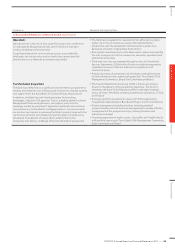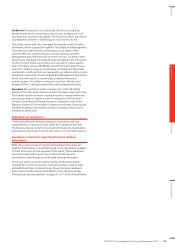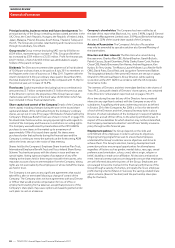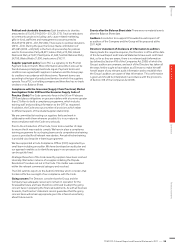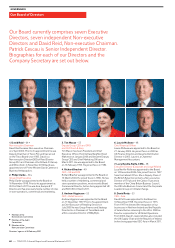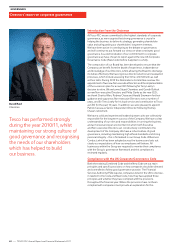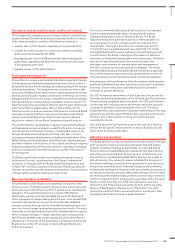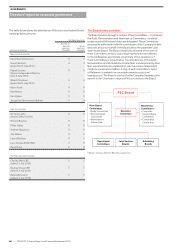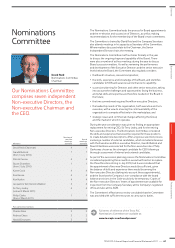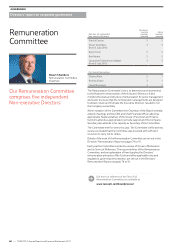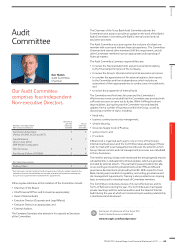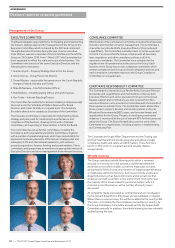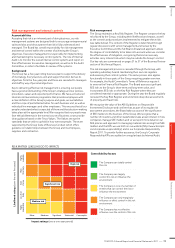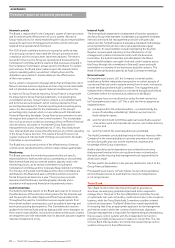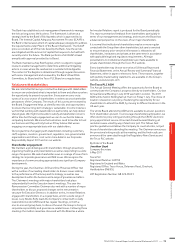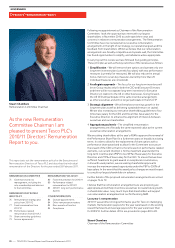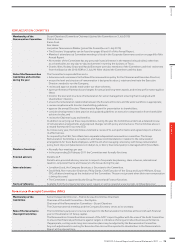Tesco 2011 Annual Report Download - page 69
Download and view the complete annual report
Please find page 69 of the 2011 Tesco annual report below. You can navigate through the pages in the report by either clicking on the pages listed below, or by using the keyword search tool below to find specific information within the annual report.
Procedures to deal with Directors’ conflicts of interest
The Company has comprehensive procedures in place to deal with any
situation where a Director has an actual or potential conflict of interest.
Under these procedures members of the Board are required to:
• consider each conflict situation separately on its particular facts;
• consider the conflict situation in conjunction with the rest of their
duties under the Companies Act 2006;
• keep appropriate records and Board minutes demonstrating any
authorisation granted by the Board for such conflict and the scope
of any approvals given; and
• regularly review conflict authorisations.
Training and development
All new Directors receive a personalised induction programme, tailored
to their experience, background and particular areas of focus, which is
designed to develop their knowledge and understanding of the Group’s
culture and operations. The programme has evolved over time to take
into account feedback from new Directors and the development of best
practice, and will usually include a combination of meetings with senior
management from across the Group, comprehensive briefing materials
and opportunities to visit the Group’s operations across the world. The
Chairman agrees the personalised induction plan for each new Director
and ensures that it is appropriately tailored. Areas of focus for the
induction process include an overview of the business model and Board
processes, as well as briefings on key issues (including social, ethical
and environmental (SEE) issues). Directors also receive a tailored
induction in relation to those Board Committees they will serve on.
The need for Director development is regularly assessed by the Board
and training sessions are arranged to upskill the Directors on a variety
of areas relevant to the Group’s business, including SEE issues. In the
last year the Board received training focusing, inter alia, on recent
corporate governance developments, including the implications of the
Walker Review and the publication of the New Code. Training was also
provided in relation to the business of Tesco Bank, including its ongoing
migration programme and the issues involved in operating a mortgage
business. It is planned to provide training on a number of key areas in
the coming year.
The Board usually holds at least one meeting overseas each year, to
facilitate the Directors’ understanding of the Group’s international
operations. In February 2010 the Board visited China and Korea, and
in March 2011 the Board visited our US business. Board trips allow the
Directors to view first-hand the progress and direction of our businesses
in these markets, as well as meeting our teams there.
Board performance evaluation
The performance of the Board is a fundamental component of the
Group’s success. The Board regularly reviews its own performance and
during the year ended 26 February 2011 it carried out an internally led
evaluation. This was the third year since a review of the Board’s
performance was last externally facilitated but, given the Board and
senior management changes taking place this year, it was decided that
it would be appropriate to carry out a further internally facilitated
evaluation process this year, with an externally facilitated process next
year, once those changes have had an opportunity to bed in. This year’s
review was coordinated and directed by the Chairman with the support
of the Company Secretary. In-depth interviews were conducted with
each Director and there was a wide-ranging discussion of the Board’s
effectiveness. The results of the review were considered in detail by the
Board, and a number of next steps to improve Board effectiveness
further were agreed.
The review confirmed that the Board had focused on the important
issues in creating shareholder value, including the UK and key
international businesses such as China and the US. The Board
had performed well on governance and much effort was taken on
an ongoing basis to ensure compliance with the Code and other
requirements. There was a good focus on societal issues and the
increasing focus on a global approach was welcomed. The review
also highlighted that there was a high level of understanding of, and
commitment to, the Board’s strategy and the balance of skills and
experience on the Board had strengthened in recent years. The Board
was seen to respond openly and constructively to events and
there were open channels of communication with management.
The CEO succession process was praised as exemplary. The review
recommended that going forward the Board should have a particular
focus on the resources required to build a global business in terms of
financial capacity, people development and operational capabilities.
Annual reviews of the performance of the Nominations, Remuneration
and Audit Committees have been carried out, led by each Committee’s
Chairman. These reviews have confirmed that each Committee
continues to operate effectively.
Our CEO reviews the performance of each Executive Director and our
Chairman reviews the performance of the CEO and each Non-executive
Director. Having completed these evaluations, the CEO and Chairman
confirm that each individual whose performance they have assessed
continues to be effective and committed to their role. The Senior
Independent Director assessed the Chairman’s performance in the year,
taking into account the views of both the Non-executive and Executive
Directors, and confirms that he continues to be effective and
committed to his role.
During the year, the Chairman met with the Non-executive Directors,
without the Executive Directors present, to discuss Board issues and
how to build the best possible team.
Attendance at meetings
The Board held nine scheduled meetings in the year ended 26 February
2011, and ad hoc meetings were also arranged to deal with matters
between scheduled meetings as appropriate. It is expected that all
Directors attend scheduled Board and relevant Committee meetings,
unless they are prevented from doing so by prior commitments, and
that all Directors will attend the AGM. Where Directors are unable to
attend meetings, they receive the papers scheduled for discussion in
the relevant meetings, giving them the opportunity to raise any issues
and give any comments to the Chairman in advance of the meeting.
Following the meeting the Chairman briefs any member not present on
the discussions and any decisions taken at the meeting. Directors leave
the meeting where matters relating to them, or which may constitute a
conflict of interest for them, are being discussed. None of the Executive
Directors holds more than one FTSE 100 external non-executive
directorship and Philip Clarke resigned his position as Non-executive
Director of Whitbread plc effective from 1 March 2011. The other
directorships held by the Non-executive Directors are set out in their
biographies which can be found on pages 60 and 61.
TESCO PLC Annual Report and Financial Statements 2011
—
65
Overview Business review Governance Financial statements


